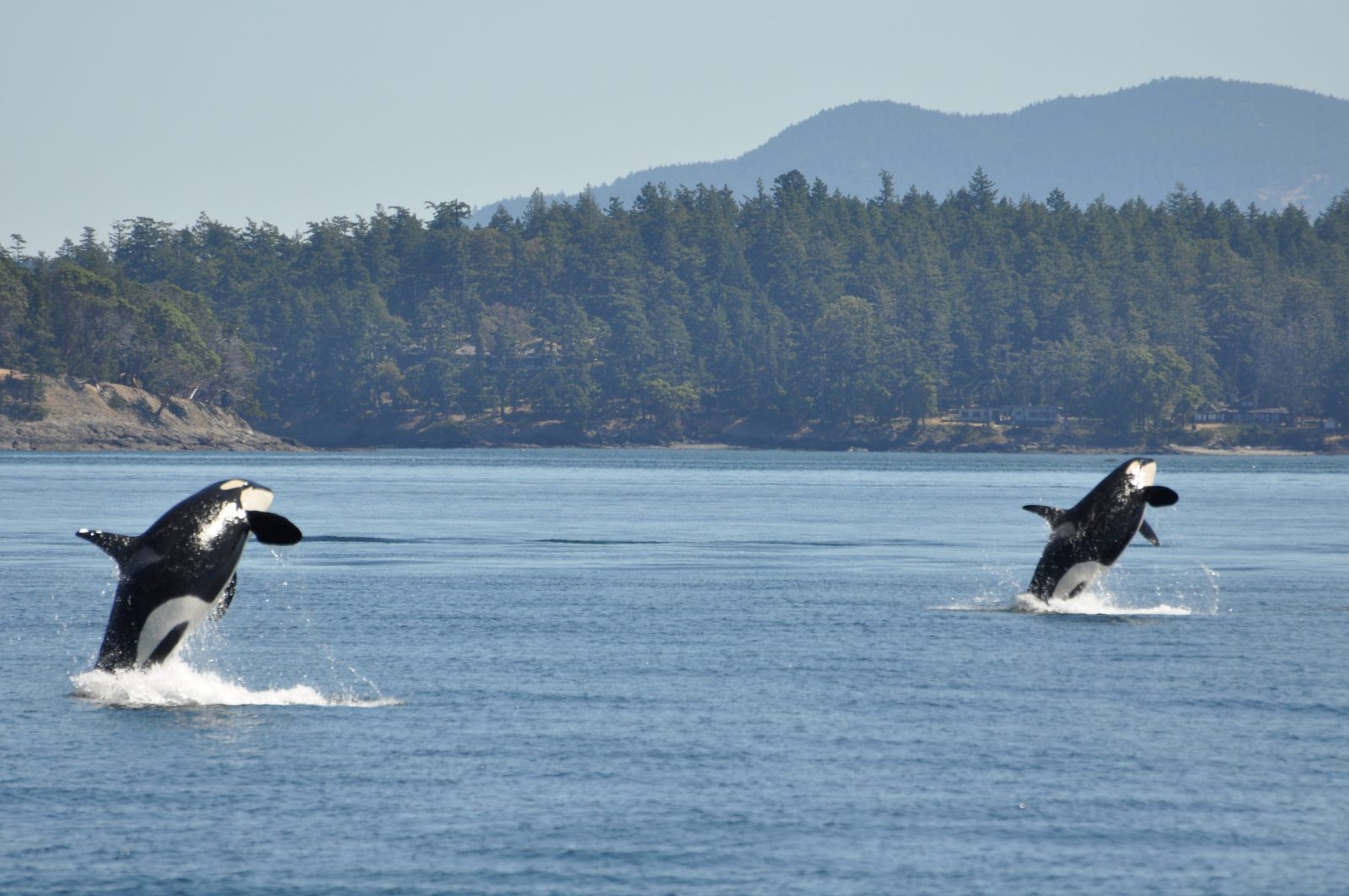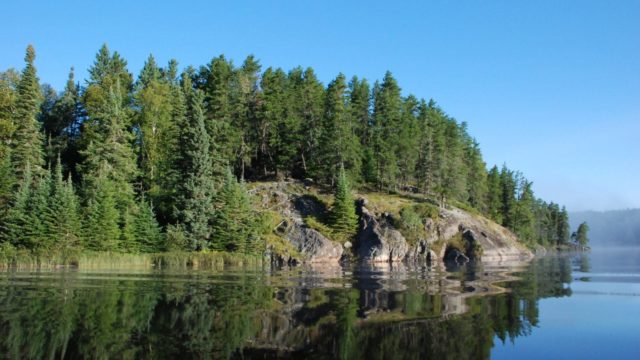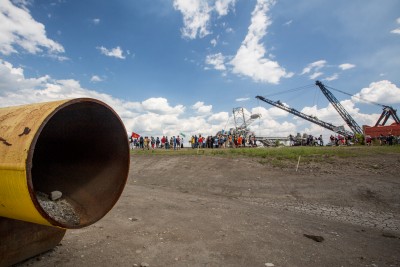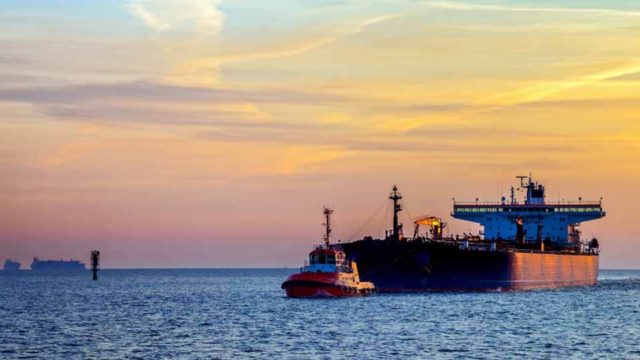We answer your questions on why we took this case on, and what makes it important
The Kinder Morgan project approval has been coming down the pipe for quite some time. While we were hoping for the government to stand up for endangered killer whales and stop this dangerous project, we knew there was a possibility the project would be approved.
But the fight isn’t over yet.
We’re asking the court to overturn Cabinet’s approval of the project due to the effects increased tanker traffic — or worse, a spill — could have on endangered Southern Resident killer whales.
Since we launched our case, we’ve heard loud and clear from supporters like you that challenging the Kinder Morgan project in the courts is of the utmost importance as we continue to face ever-increasing threats to ocean life and our climate.
As we all try to better understand the implications of the federal government’s approval of this project, you’ve also been in touch with some thoughtful questions. Here are our team’s answers to the most common inquiries we’ve received so far:
Why did we take on this case?
Back in May 2016, when the National Energy Board (NEB) recommended Cabinet approval of the Kinder Morgan project in its final report, we were disappointed but not at all surprised.
In its report to Cabinet, the NEB said that its environmental assessment under the Canadian Environmental Assessment Act (CEAA 2012) only considered the pipeline and marine terminal, and not oil tankers. As a result of excluding marine shipping from the environmental assessment of the Project, there was no “environmental assessment” conducted of the impacts of marine shipping on whales and no protection for Southern Resident killer whales considered.
Instead, the NEB says that it looked at the impacts of marine shipping, but only under the general “public interest” provision of the National Energy Board Act (and not as part of the environmental assessment). According to the NEB, this means that it wasn’t required to follow the requirements of the Species at Risk Act (SARA) that are triggered by an environmental assessment with respect to marine species at risk.
While the NEB acknowledged the project’s seven-fold increase in oil tanker traffic in the Salish Sea would have “significant adverse effects” on the endangered Southern Resident killer whales, it didn’t apply SARA’s requirements to avoid or mitigate the effects, and it recommended in favour of the project anyway.
When Cabinet announced its approval of the project in November, it accepted the NEB’s flawed approach. Cabinet’s decision adopted the NEB’s report without fixing any of its problems. The much-touted conditions still don’t include measures to protect the whales and their critical habitat.
This is an important legal shortcoming that also has important practical implications.
The practical effect of the NEB and Cabinet’s approach is that no one is required to address the Kinder Morgan project’s impacts on the whales. The NEB was the agency assigned to do an environmental assessment of the project and its effects, and Cabinet’s approval was the only one needed — there is no separate review of marine impacts to follow. If they do not take responsibility for assessing marine impacts of the project and complying with SARA, the impacts to whales will go unaddressed.
Since making the decision, the government has promised to explore actions to help protect the whales. The problem with this approach is that these promises are short on details and they are not binding. The whole point of the SARA legal protections is to make sure there is a plan in place to protect endangered species before any new impacts on them are approved.
Ecojustice and its clients have worked for years to enforce legal protections for the Southern Resident killer whales and their habitat. If the Kinder Morgan project proceeds and impacts from vessel noise, pollution and a shortage of prey are not addressed, it will have significant adverse effects on this already endangered species — including, according to our clients’ uncontroverted expert evidence, a more than 50 per cent chance of becoming effectively extinct this century.
The importance of this case goes beyond the Kinder Morgan project and its effects on Southern Resident killer whales. If the NEB and Cabinet’s approach is allowed to stand, other projects with marine impacts, such as TransCanada’s Energy East pipelein, could also avoid an environmental assessment of their marine impacts and avoid ensuring that the steps needed to protect marine species at risk are taken.
What do we hope this case will accomplish?
If the case is successful, there will be a clear precedent that regulators and Cabinet cannot avoid their legal responsibilities for protecting endangered species by taking an overly narrow approach to environmental assessments and project approvals.
If it is not, and the Court says that the NEB and Cabinet do not have to meet SARA requirements in spite of the effect project-related tankers will have on endangered killer whales, it will be clear that there is an urgent need for reform of our environmental assessment law so that regulators and decision-makers can’t avoid protecting endangered species and upholding the purposes of SARA by taking an overly narrow approach to project reviews and approvals.
How does this case relate to other Kinder Morgan challenges being filed?
Others challenging the NEB’s initial report include, the Squamish Nation, Tsleil-Waututh Nation, the Coldwater Indian Band, Burnaby, and Vancouver. And that’s not all. A number of the same groups are also challenging Cabinet’s decision too: The Tsleil-Waututh Nation, the Squamish Nation, the Coldwater Indian Band, the Musqueam Indian Band, Upper Nicola Band, the Stk’emlupsemc Te Secwepemc of the Secwepmc Nation, a Sto:lo collective, and the city of Burnaby – as well as our clients.
Together, the cases cover a wide range of issues related to the NEB’s review, alleging, among other things, failure to consult First Nations, a lack of procedural fairness during the review process, inadequate environmental assessment, and failure to properly and thoroughly consult local communities along the pipeline and tanker route.
What makes our case a bit different is that it focuses specifically on the legal issue of the NEB defining the “project” narrowly to exclude project-related oil tankers and ignoring its responsibilities towards marine species under SARA.
Why not accept the proposed compromise, where Northern Gateway is rejected and Kinder Morgan is approved?
Ecojustice is opposed to fossil fuel infrastructure projects that keep Canada on an unsustainable and reckless path of tar sands expansion and fossil fuel use, impeding the transition to clean energy technologies.
Twinning our pipeline infrastructure is not conducive to a clean-energy future, a healthy planet, or healthy communities. According to Environment and Climate Change Canada (ECCC), the Kinder Morgan project, and the recently approved Line 3 pipeline project, will contribute an additional 23 to 28 megatons of carbon pollution per year. This is a staggering number, especially given that the ECCC also said that increasing production “could also increase total global oil supply, lowering global prices and increasing the quantity of oil consumed.”
Expanding oil production is incompatible with Canada’sgoal of bringing emissions 30 per cent below 2005 levels by 2030.
To put it simply, fossil fuels need to be kept in the ground. To make that happen, we must oppose projects that threaten our environment and take us in the wrong direction on climate change. The Kinder Morgan pipeline falls squarely within these lines. This is why we represented Raincoast Conservation Foundation and Living Oceans Society as interveners throughout the Kinder Morgan review.
Ecojustice is also opposed to projects that threaten the survival and recovery of endangered species — such as the Kinder Morgan project and its effect on the Southern Resident killer whales. And as a legal organization we think it is essential that any review of a major project follows the letter of the law. That is why we are now representing Raincoast Conservation Foundation and Living Oceans Society in their judicial review of the NEB’s report and Cabinet’s decision.
What about other vessel traffic that may be affecting orcas?
We are concerned about the threat that all vessel traffic, including container shipping, tanker traffic, ferries and whale watching boats, poses to Southern Resident killer whales.
The Salish Sea is the noisiest part of British Columbia’s Coast. Scientists state that up to 90 per cent of whales’ communication space is already taken up during busy traffic times. This noise interferes with the whales’ ability to hear and therefore hunt and communicate.
The Species at Risk Act is supposed to protect the whales from harm and their critical habitat from destruction, but due to the lack of environmental assessments required, there are limited legal tools available to address existing and growing vessel traffic. But that doesn’t mean there are no options. New shipping terminals also trigger environmental assessments and the Species at Risk Act requirements to avoid or lessen the project’s effects on species like the Southern Residents.
To survive and recover the Southern Resident killer whales need protection from ocean noise that limits human caused sound in the Salish Sea. While our focus right now is on tanker traffic noise from the Kinder Morgan project (which poses the additional threat of an oil spill), we are keeping a close eye on other projects that will lead to increased vessel noise in the whales’ critical habitat.
How can I support this case?
Ecojustice relies on the generosity of donors and supporters like you to make our work possible. You can help by sharing the news about our new case launch to friends and family, or making a donation today.
When we announced the launch of our case in December, we were overwhelmed with the generosity of our community, which responded by flooding us with donations and messages of support. We know that there are many people committed to preserving the Southern Resident killer whales’ critical habitat and shutting down reckless fossil fuel expansion, and we are incredibly grateful for your support so far in this work. Your support means we can put up the best fight possible to shut the door on the Kinder Morgan project.





